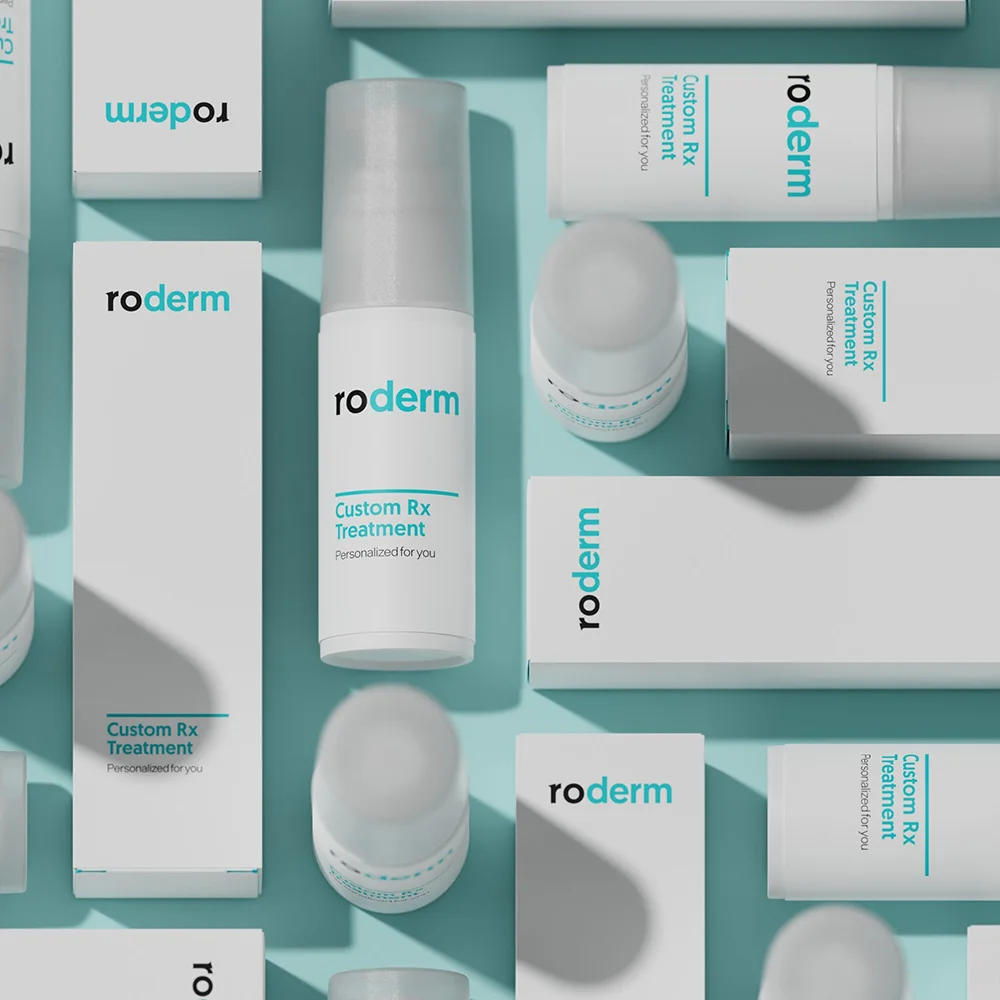Here's what we'll cover
Here's what we'll cover
Here's what we'll cover
If you’re using a topical retinoid, there’s a good chance you’re hoping to erase the signs of aging brought on by sun damage. If that’s the case, you likely already know that sunscreen is the best way to prevent skin damage (that’s the number one reason to invest and apply sunscreen whenever you’re getting rays).
But there’s another reason to apply sunscreen: it’s an important part of a retinoid-based skin care program because your skin can be especially sun-sensitive if you’re just starting a retinoid.
Let’s take a look at retinoids, sunlight, and how to navigate the best sun-safe approaches to your skincare routine.
How do retinoids work?
Retinoids include an entire class of medications that come in both oral and topical forms. As a skincare product, topical tretinoin has become a gold standard for combating acne and reducing the signs of aging, some of which are brought on by the sun (Zasada, 2019).
Sun exposure causes premature aging, which involves a process called photoaging. Ultraviolet radiation (UVA and UVB) can damage skin cells such as collagen, and it affects the ability of the skin to regenerate, leading to thinner, rough skin, brown spots, and sometimes skin cancer (Guan, 2021). Retinoids can help reverse some of that damage.
Topical retinoids boost skin cell turnover (when your skin sheds its dead skin cells and replaces them with new cells) and repair DNA damage caused by past sun damage. This leads to improvements in fine lines, dullness, and texture. They also increase collagen and elastin fibers, making the skin look firmer (Zasada, 2019).
Studies have shown that tretinoin (Retin-A) can reduce the appearance of fine lines, wrinkles, and brown spots (hyperpigmentation) while firming up collagen. Other prescription-strength retinoids are typically used to fight acne, as retinoids also reduce clogged pores, blackheads, and breakouts (Leyden, 2017).
Tretinoin Important Safety Information: Read more about serious warnings and safety info.
Retinoids, skin, and sunlight
After starting a retinoid, especially a prescription-strength product, some notice what’s been called the ‘retinoid burn’ or a ‘retinoid reaction.’ It can feel like a sunburn, even if you haven’t been in sunlight (Boswell, 2006).
What’s happening is that retinoids trigger more skin cell turnover, which can lead to irritation and the peeling off of top layers of dead skin. Not everyone experiences this, but it’s a common part of the process (Zasada, 2019).
Because retinol brings newer and more delicate skin to the surface, you also need to protect your skin from sunlight. The top layer of skin is thinner, especially during this early period of treatment, and there can be the potential for a worse sunburn because a layer of dead skin is no longer protecting the newer skin below. Besides, if you take this irritated skin and put it in the heat of the sun, it can feel like it’s burning quickly (Kryczyk-Poprawa, 2020).
Because of this sun sensitivity—called photosensitization—retinoid users are advised to avoid excessive sun exposure and use sunscreens with an SPF 30+ or higher that offer complete UVA/UVB protection. Keep in mind everyone has a different level of melanin in their skin and a different reaction to the use of retinoids. Burns can occur easily for some, whether a retinoid is a factor or not. So, it’s important to stick with sunscreen, especially if your goal is to avoid wrinkles (Mukherjee, 2006).
Best daily retinoid regimen
If you have a prescription retinoid, your healthcare provider will give you instructions based on the strength. It’s best to start slowly, and if your skin is sensitive, it may take time to work up to regular retinoid use.
While, you should always follow your healthcare provider's instructions when using a retinoid, here is a typical approach that incorporates a retinoid such as topical tretinoin into your daily skincare routine (Buchanan, 2016; Leydan, 2017):
Evenings
The best daily retinoid regimen begins at night to take advantage of the dark and to avoid the harsh sunlight hours. Some dermatologists suggest making this the last thing you do before turning off the lights. To start your routine:
Wash your face using a mild cleanser; pat dry.
Apply a thin layer of a retinoid around your face following dosing directions 2–3 nights a week (no more than a pea-sized amount if tretinoin).
Avoid your eye area and mouth, including the corners of your mouth and nose.
Apply a moisturizer after the retinoid to reduce irritation and dryness.
If the retinoid is well-tolerated, you may be able to increase the frequency.
Note: Some products can deactivate retinoids or cause extra irritation, so it’s best to check with your healthcare provider about using other products during treatment. On nights you are skipping your retinoid, continue to wash and moisturize.
Mornings
Once the sun rises, it’s time to wash your face to remove the retinoid. You should then apply any additional products that you use. Be sure to avoid heavy exfoliation if you’ve just started using a retinoid. Patch testing other products on parts of your face may be best to avoid reactions, and if your skin is irritated, skip extra products and just moisturize (Kockaert, 2003).
Finally, add sunscreen each morning with an SPF 30+ if you will be outside during the day. Sunscreen should be the very last step of your morning skincare routine.
Daytime
If you’re planning on spending a lot of time outside during the day, here are a few tips to ensure you’re still getting the most out of your retinoid regimen:
If in the sun, reapply sunscreen every two hours (more if needed, e.g., swimming).
If you plan to be in the sun for the whole day, use SPF 30+ and reapply often.
If it’s a heavy sun day, sunglasses and a hat can offer extra protection.
The sun’s rays are strongest between 10 am and 2pm—seek shade during that time, if possible.
What to expect when using retinoids
If you’ve just started using a retinoid, you may be wondering what to expect and when you may start seeing results. Here is a look at what you can expect symptom-wise and a rough estimate of when you should start seeing results:
Over-the-counter retinols tend to be milder and don’t cause as much irritation; you may notice your skin has a brighter appearance after a few weeks.
Tretinoin may cause drying, irritation, and peeling skin.
Using more tretinoin will not speed up your facial skin changes and may worsen skin irritation, so only use the amount recommended by your provider.
At about 2–4 weeks, the irritation starts to resolve, and it may take 12–15 weeks for you to see significant improvement in your skin.
It may take up to 16 weeks for the treatment to take full effect.
Do retinoids degrade in sunlight?
If you’ve noticed retinoid products come in metal tubes, opaque containers, and sometimes dark glass, there’s a reason. Retinoids lose effectiveness and break down when exposed to light—especially sunlight (Kryczyk-Poprawa, 2020). Even the light from regular indoor lighting can affect your retinoid (Del Rosso, 2012).
When to see a healthcare provider
Any time you’re using a prescription medication, a consult with a healthcare provider can offer tailored advice and guidance.
If you are pregnant, breastfeeding, or are planning to become pregnant, avoid retinoids, and discuss other skincare options with your healthcare provider. Why? The oral retinoid isotretinoin (Accutane) is linked to birth defects (FDA, 2010). And if you have other medical conditions, including skin conditions, check to see if retinoids may cause any reactions (Bozzo, 2011).
In general, it’s best to let your healthcare provider know about any medications, including prescription and over-the-counter medicines, vitamins, or supplements you are taking. Most people are able to use a retinoid, and the strength of the formula is often based on personal preference.
DISCLAIMER
If you have any medical questions or concerns, please talk to your healthcare provider. The articles on Health Guide are underpinned by peer-reviewed research and information drawn from medical societies and governmental agencies. However, they are not a substitute for professional medical advice, diagnosis, or treatment.
References
Boswell, C. (2006). Skincare science: Update on topical retinoids. Aesthetic Surgery Journal , 26 (2), 233–239. doi: 10.1016/j.asj.2006.02.003. Retrieved from https://academic.oup.com/asj/article/26/2/233/219113
Bozzo, P., Chua-Gocheco, A., & Einarson, A. (2011). Safety of skin care products during pregnancy. Canadian Family Physician, 57 (6), 665–667. Retrieved from https://www.ncbi.nlm.nih.gov/pmc/articles/PMC3114665/
Buchanan, P. J. & Gilman, R. H. (2016). Retinoids: Literature review and suggested algorithm for use prior to facial resurfacing procedures. Journal of Cutaneous and Aesthetic Surgery , 9 (3), 139. doi: 10.4103/0974-2077.191653. Retrieved from https://www.ncbi.nlm.nih.gov/pmc/articles/PMC5064676/
Del Rosso, J. Q., Harper, J., Pillai, R., & Moore, R. (2012). Tretinoin photostability: comparison of micronized tretinoin (0.05%) gel and tretinoin (0.025%) gel following exposure to ultraviolet a light. The Journal of Clinical and Aesthetic Dermatology, 5 (1), 27–29. Retrieved from https://www.ncbi.nlm.nih.gov/pmc/articles/PMC3277089/
Guan, L. L., Lim, H. W., & Mohammad, T. F. (2021). Sunscreens and photoaging: A review of current literature. American Journal of Clinical Dermatology , 22 (6), 819–828. doi: 10.1007/s40257-021-00632-5. Retrieved from https://www.ncbi.nlm.nih.gov/pmc/articles/PMC8361399/
Kockaert, M. & Neumann, M. (2003). Systemic and topical drugs for aging skin. Journal of Drugs in Dermatology, 2 (4), 435–441. Retrieved from https://pubmed.ncbi.nlm.nih.gov/12884471/
Leyden, J., Stein-Gold, L., & Weiss, J. (2017). Why topical retinoids are mainstay of therapy for acne. Dermatology and Therapy , 7 (3), 293–304. doi: 10.1007/s13555-017-0185-2. Retrieved from https://www.ncbi.nlm.nih.gov/pmc/articles/PMC5574737/
Mukherjee, S., Date, A., Patravale, V., Korting, H. C., Roeder, A., & Weindl, G. (2006). Retinoids in the treatment of Skin aging: An overview of clinical efficacy and safety. Clinical Interventions in Aging , 1 (4), 327–348. doi: 10.2147/ciia.2006.1.4.327. Retrieved from https://www.ncbi.nlm.nih.gov/pmc/articles/PMC2699641/
U.S. Food & Drug Administration (FDA). (2010). Roche: Accutane (isotretinoin capsules). Retrieved Jan. 25, 2022 from https://www.accessdata.fda.gov/drugsatfda_docs/label/2010/018662s060lbl.pdf
Zasada, M. & Budzisz, E. (2019). Retinoids: Active molecules influencing skin structure formation in cosmetic and dermatological treatments. Advances in Dermatology and Allergology , 36 (4), 392–397. doi: 10.5114/ada.2019.87443. Retrieved from https://www.ncbi.nlm.nih.gov/pmc/articles/PMC6791161/






